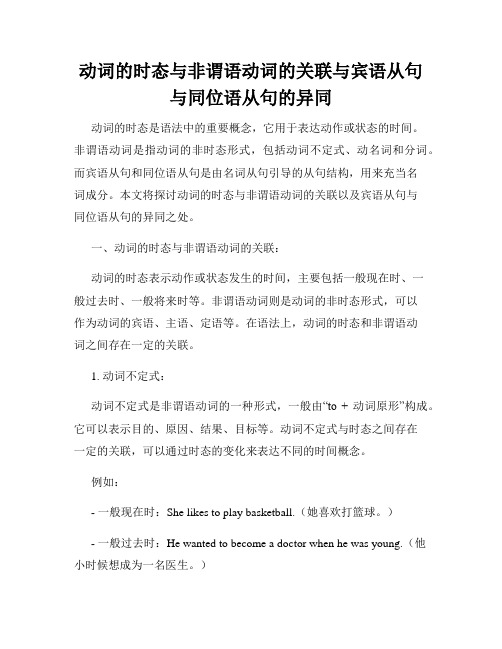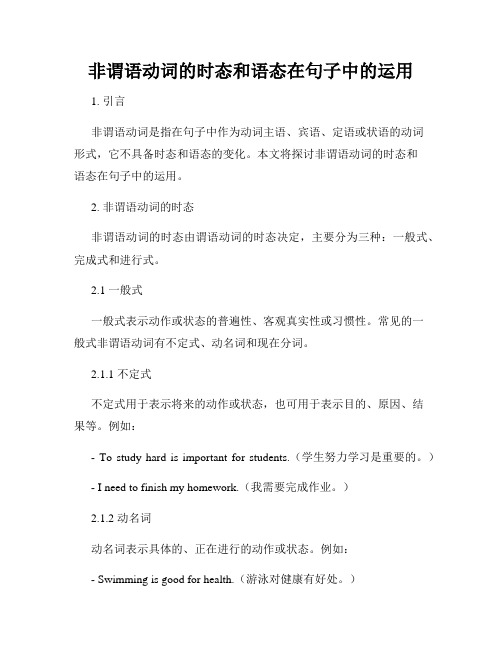非谓语动词与时态
非谓语动词的时态和语态

非谓语动词的时态和语态非谓语动词是指在句中不充当谓语成分,通常以动词原形或动词的其他非限定形式呈现的动词。
非谓语动词的时态和语态主要根据上下文确定,本文将详细介绍非谓语动词的时态和语态的使用。
一、非谓语动词的时态1. 不定式:不定式作为非谓语动词形式,不受时态的限制,通常表示动作发生在谓语动词所表示的动作之前。
例如:- To understand English well, one must practice every day.(为了能够很好地理解英语,人们必须每天练习。
)- I forgot to buy milk on the way home.(我从没想到,在回家的路上忘了买牛奶。
)2. 现在分词:现在分词作为非谓语动词形式,通常表示与谓语动词所表示的动作同时或一般性的动作。
例如:- Walking along the street, I noticed a small cafe.(在街上走的时候,我注意到了一家小咖啡馆。
)- The teacher was talking to the students, explaining the new lesson.(老师正在和学生们谈话,解释新的课程。
)3. 过去分词:过去分词作为非谓语动词形式,通常表示在谓语动词所表示的动作之前已经完成的动作。
例如:- Having finished his homework, the boy went out to play.(孩子做完作业后,出去玩了。
)- The injured man was taken to the hospital, accompanied by his family.(受伤的人被他的家人陪同着送到了医院。
)二、非谓语动词的语态非谓语动词的语态主要包括主动语态和被动语态,具体如下:1. 不定式的语态:不定式的语态通常与主句的语态保持一致。
例如:- She wants to be promoted.(她想要升职。
动词的时态与非谓语动词的关联与宾语从句与同位语从句的异同

动词的时态与非谓语动词的关联与宾语从句与同位语从句的异同动词的时态是语法中的重要概念,它用于表达动作或状态的时间。
非谓语动词是指动词的非时态形式,包括动词不定式、动名词和分词。
而宾语从句和同位语从句是由名词从句引导的从句结构,用来充当名词成分。
本文将探讨动词的时态与非谓语动词的关联以及宾语从句与同位语从句的异同之处。
一、动词的时态与非谓语动词的关联:动词的时态表示动作或状态发生的时间,主要包括一般现在时、一般过去时、一般将来时等。
非谓语动词则是动词的非时态形式,可以作为动词的宾语、主语、定语等。
在语法上,动词的时态和非谓语动词之间存在一定的关联。
1. 动词不定式:动词不定式是非谓语动词的一种形式,一般由“to + 动词原形”构成。
它可以表示目的、原因、结果、目标等。
动词不定式与时态之间存在一定的关联,可以通过时态的变化来表达不同的时间概念。
例如:- 一般现在时:She likes to play basketball.(她喜欢打篮球。
)- 一般过去时:He wanted to become a doctor when he was young.(他小时候想成为一名医生。
)- 一般将来时:They are going to visit their grandparents next week.(下周他们打算去看望他们的祖父母。
)2. 动名词:动名词是非谓语动词的一种形式,一般由动词的-ing形式构成。
它可以作为主语、宾语、表语或定语等。
与动词的时态关联,动名词通常没有明确的时态概念,而是通过上下文来确定动作发生的时间。
例如:- 一般现在时:Listening to music helps me relax.(听音乐帮助我放松。
)- 一般过去时:I enjoyed playing football when I was a child.(小时候我喜欢踢足球。
)- 一般将来时:She is considering going abroad for further study.(她正在考虑出国深造。
初中英语非谓语动词的时态和语态

非谓语动词的时态和语态非谓语动词的时态和语态形式一、非谓语动词的时态(不含过去分词)一般式:非谓语动词的一般式表示的动作可以与谓语动词表示的动作同时发生或发生在谓语动词表示的动作之前或之后。
I saw he go out/going out.He stood there crying.He insisted on joining the army.Thank you for giving us so much help.完成式:非谓语动词的完成式表示的动作发生在谓语动词表示的动作之前I am sorry to have kept you waiting.He was praised for having taught for 60 years.Having finished the work he went home.不定式的完成式和完成进行式:只有动词不定式有这两种时态。
其进行式表示的动作正在进行,与谓语动词表示的动作同时发生;其完成进行式表示的动作在谓语动词表示的动作之前一直进行。
They seems to be getting along well now.We’re happy to have been working with you.二、非谓语动词的语态(不含过去分词)一般被动式I’m glad to be invited here.He did it without being asked.The building being built is our school.The book is said to have been translated into chinese.It’ said that 据说…sb./sth. be said to do sth.据说某人某物…She has no memory of having been praised.The plan having been made, he carried it out at once.。
动词时态语态、非谓语动词

⑤用现在进行时时表将来的词语:come go arrive leave begin start eg. I’m leaving for Beijing next month. ⑥用现在时表将来:火车时刻、飞机时刻、 电影开演、作息安排上 Eg. We are supposed to hurry up. The first class begins at 8 o’clock. ⑦be to+动词原形 Eg. I am to leave.
一般过去式: 一般过去式的动词形式: 使用动词的过去式,一般加ed Pack-Packed 以辅音加y结尾的动词变y为i加ed Carry-Carried但play—played 双写再加ed的 Plan-Planned 以e结尾的直接加d Like-Liked
一般将来时:
一般将来时的用法: ①将来发生的动作状态 Eg. He will go to school tomorrow. ②用will表示事物的固有属性和必然趋势 Eg. Fish will die without water. ③用be going to 表示计划、打算以及推测 Eg. We are going to read this book. It is going to rain tomorrow. ④be about to 表示立刻要发生的 Eg. The train is about to start.
6. How long ______you_______ (live) in this town? 7. You _______ (come) here last year, ______ you? 8. ----When ______ you______ (see) him? ----I______ (see) him last Sunday.
非谓语动词的时态和语态在句子中的运用

非谓语动词的时态和语态在句子中的运用1. 引言非谓语动词是指在句子中作为动词主语、宾语、定语或状语的动词形式,它不具备时态和语态的变化。
本文将探讨非谓语动词的时态和语态在句子中的运用。
2. 非谓语动词的时态非谓语动词的时态由谓语动词的时态决定,主要分为三种:一般式、完成式和进行式。
2.1 一般式一般式表示动作或状态的普遍性、客观真实性或习惯性。
常见的一般式非谓语动词有不定式、动名词和现在分词。
2.1.1 不定式不定式用于表示将来的动作或状态,也可用于表示目的、原因、结果等。
例如:- To study hard is important for students.(学生努力学习是重要的。
)- I need to finish my homework.(我需要完成作业。
)2.1.2 动名词动名词表示具体的、正在进行的动作或状态。
例如:- Swimming is good for health.(游泳对健康有好处。
)- I enjoy reading books.(我喜欢读书。
)2.1.3 现在分词现在分词表示被动或进行的动作或状态。
例如:- The boy standing there is my brother.(站在那儿的男孩是我的弟弟。
)- The book written by him is famous.(由他写的那本书很有名。
)2.2 完成式完成式表示动作已经完成或发生在谓语动词之前。
常见的完成式非谓语动词有完成式不定式、完成式动名词和过去分词。
2.2.1 完成式不定式完成式不定式表示在谓语动词之前完成的动作。
例如:- He seems to have forgotten everything.(他似乎忘记了一切。
)- I am glad to have finished the task.(我很高兴完成了任务。
)2.2.2 完成式动名词完成式动名词表示在谓语动词之前完成的动作。
例如:- Having studied for two hours, he finally understood the concept.(经过两个小时的学习,他终于理解了这个概念。
系统学习语法非谓语动词的时态与语态变化

系统学习语法非谓语动词的时态与语态变化语法非谓语动词是英语中的一个重要语法点,其时态与语态的变化是我们学习英语的基础。
本文将系统介绍语法非谓语动词的时态变化和语态变化,旨在帮助读者更好地理解和运用这一语法知识点。
一、时态变化1. 现在分词(Present Participle)的时态变化现在分词表示正在进行或同时发生的动作,其时态的变化相对简单,即在动词的原形(V1)后加-ing。
例如:- 我现在在读书。
I am reading now.2. 过去分词(Past Participle)的时态变化过去分词表示已经完成的动作或状态,其时态的变化需要根据不同的情况来判断。
- 若是规则动词,则在动词的原形(V1)后加-ed。
例如:- 我昨天洗了衣服。
I washed the clothes yesterday.- 若是不规则动词,则需要根据动词的不规则变化形式进行变化。
例如:- 我吃了晚饭。
I have eaten dinner.3. 动词不定式(Infinitive)的时态变化动词不定式表示目的或未来的动作,其时态的变化相对简单,即在动词的原形(V1)前加to。
例如:- 我打算明天去购物。
I plan to go shopping tomorrow.二、语态变化语态是英语中的一个重要语法点,包括主动语态和被动语态。
在非谓语动词中,语态的变化需要根据时态来确定。
1. 主动语态(Active Voice)的语态变化主动语态表示主语是动作的执行者,变化相对简单,即保持非谓语动词的原形形式。
例如:- 我正在听音乐。
I am listening to music.2. 被动语态(Passive Voice)的语态变化被动语态表示主语是动作的承受者,变化需要根据不同的时态来确定。
- 现在分词的被动语态变化为:be + being + 过去分词例如:- 她正在被教授指导。
She is being taught by the professor.- 过去分词的被动语态变化为:be + 过去分词例如:- 他被邀请参加宴会。
中考语法知识点归纳动词时态语态与非谓语动词
中考语法知识点归纳动词时态语态与非谓语动词动词时态、语态与非谓语动词是中考英语中的重要考点,掌握好这些知识,将有助于提升语法水平和英语写作能力。
本文将对中考语法知识点进行归纳总结,帮助同学们更好地理解和应用。
一、动词时态动词时态是指动词表示的动作或状态发生的时间或状态。
常见的动词时态有以下几种:1. 一般现在时:表示经常性、习惯性的动作或客观真理。
例句:He plays basketball every day.2. 一般过去时:表示过去某个时间发生的动作或状态。
例句:I watched a movie last night.3. 一般将来时:表示将来要发生的动作或状态。
例句:I will go to Beijing next week.4. 现在进行时:表示现在正在进行的动作。
例句:She is reading a book now.5. 过去进行时:表示过去某个时间正在进行的动作。
例句:I was studying when he called me.6. 现在完成时:表示过去的动作对现在造成的影响或结果。
例句:She has visited Paris three times.7. 过去完成时:表示对过去某个时间之前发生的动作进行的描述。
例句:They had already left when I arrived.二、动词语态动词语态是指动作发出的主体和动作所受的影响关系。
英语中常见的动词语态有以下几种:1. 主动语态:表示主语是动作的发出者。
例句:He fixed the car yesterday.2. 被动语态:表示主语是动作的承受者。
例句:The car was fixed by him yesterday.3. 进行时态:表示主语正在进行的动作处于进行状态。
例句:The book is being read by her.4. 完成时态:表示主语已经完成的动作处于完成状态。
例句:The book has been read by her.注意:被动语态需要根据动作的时态来变换,同时需要适当更改时态动词。
英语非谓语
非谓语形式有三种:1、动词不定式:to do2、动词的ing : doing3、动词的过去分词:done。
其中不定式表示目的和将来;动词的ing表示主动和进行;过去分词表示被动和完成。
非谓语动词三种形式在句中充当不同的成分,表达不同的意义,具体如下表:非谓语动词的时态和语态:一般式:不定式:主动to do ,被动to be done ; ing 形式:主动doing ,被动being done ;过去分词:被动done完成式:不定式:主动to have done ,被动to have been done;ing 形式:主动having done,被动having been done进行式:不定式to be doing1、动词不定式的基本用法:动词不定式能起名词、形容词和副词的作用,可在句中作主语、表语、宾语补足语、定语和状语用,(to)+ do,具有名词、形容词、副词的特征。
否定式:not + (to) do 如:(1)作主语:动词不定式作主语时,一般可用it作形式主语,而将作主语的动词不定式置于句末,如:It is very hard to finish the work in ten minutes. 十分钟之内完成这项工作是很难的。
It means failure to lose your heart. 灰心意味着失败。
常用句式有:1、It+be+名词+to do。
2、It takes sb.+some time+to do。
(2)作表语:动词不定式在系动词be之后作表语,与表示将来时的be + 动词不定式结构有所区别。
如:Her job is to clean the hall. 她的工作是打扫大厅。
(3)作宾语:①作及物动词的宾语,如:She wishes to be a musician.;②作某些形容词的宾语:可以有动词不定式为宾语的形容词一般有glad, sorry, afraid, pleased, determined, willing, eager, anxious, ready, sure等;③动词不定式一般不作介词的宾语,但动词不定式之前如有疑问词时,就可作介词的宾语,如:Can you give us some advice on what to do next?(4)作宾语补足语:在复合宾语中,动词不定式可充当宾语补足语,如下动词常跟这种复合宾语:want,wish,ask,tell,order,beg,permit,help,advise,persuade,allow,prepare,cause,force,call on,wait for,invite.此外,介词有时也与这种复合宾语连用,如:With a lot of work to do,he didn't go to the cinema.他有很多工作要做,所以没去电影院。
非谓语动词的时态和语态在句子中的运用和非谓语动词的种类和非谓语动词在句子中的位置和作用
非谓语动词的时态和语态在句子中的运用和非谓语动词的种类和非谓语动词在句子中的位置和作用非谓语动词指的是不具备主谓关系的动词形式,它可以在句子中充当主语、宾语、状语等成分。
非谓语动词的时态和语态在句子中起到了很重要的作用,并且还有多种类型和不同的位置和作用。
本文将对非谓语动词的时态和语态在句子中的运用、非谓语动词的种类以及非谓语动词在句子中的位置和作用进行探讨。
一、非谓语动词的时态和语态在句子中的运用在句子中,非谓语动词可以使用不同的时态和语态来表达不同的动作状态和语气。
下面是非谓语动词的时态和语态的运用情况:1. 一般式和完成式非谓语动词的一般式常用于表示与主句谓语所表示的动作同时或在之前发生的动作,如:She enjoys dancing.(她喜欢跳舞。
)而完成式常用于表示发生在谓语之前的动作,如:Having finished her work, she went home.(她完成工作后回家了。
)2. 进行式非谓语动词的进行式表示主句谓语所表示的动作正在进行中,如:I saw him running in the park.(我看见他在公园里跑。
)3. 被动语态非谓语动词的被动语态表示主语是动作的承受者,如:The book was written by him.(这本书是他写的。
)二、非谓语动词的种类非谓语动词按照形式可以分为动名词、不定式和分词,它们在句子中具有不同的用法和功能。
1. 动名词动名词是以-ing结尾的动词形式,可以作为主语、宾语、表语、宾补等。
例如:Smoking is harmful to health.(吸烟对健康有害。
)动名词可以用来表示一种习惯或者一般的行为。
2. 不定式不定式是动词的一种形式,可以表达出动作的目的、愿望、能力、推测等。
例如:He wants to learn a new language.(他想要学一门新的语言。
)不定式可以用来表示一个人的目标或者动作的原因。
非谓语动词语法讲解
单击此处可添加副标题
I prefer to stay at home today.(具体某次行为) He prefers walking to cycling.(惯常行为) 一般说来不能用于进行时的动词如:realize,know,understand,see,lose等,多用不定式 如:I began to realize I had been wrong. We hate to lose the chance . Now we are beginning to see it more clearly.
作 定 语
作 状 语
▲C.分词的完成式一般不用来作定语,只能用作状语.
ed as a means of traffic in China,the bike is very useful. Written in simple English, the book is easy to read 2. Being used by me now,the bike can’t be lent to you. 3. Having been used for many years, the bike needs repairing. Having been told several times, 可以写成=Told several times,
▲B.在语态上,ing分词表“主动”,ed分词表“被动”(多为及物动词)
The platform having been built will be used to perform on. × 1.The platform built will be used to perform on. √ The platform which has been built will be used to perform on. √ 2. Having given her opinion about the building, she left the meeting. Having been used for a long time, the computer needs repairing.
- 1、下载文档前请自行甄别文档内容的完整性,平台不提供额外的编辑、内容补充、找答案等附加服务。
- 2、"仅部分预览"的文档,不可在线预览部分如存在完整性等问题,可反馈申请退款(可完整预览的文档不适用该条件!)。
- 3、如文档侵犯您的权益,请联系客服反馈,我们会尽快为您处理(人工客服工作时间:9:00-18:30)。
非谓语动词与时态、语态专练1、Most of the young people enjoy _______ Jay Chou’s song.A. singB. sangC. singingD. to sing2、Richard turned off the computer after he had finished ________ the email.A. writeB. to writeC. writingD. wrote3、Granny often tells us ______ water in our daily life .A. saveB. to saveC. savingD. saves4、---Mary dances best in our school.---I agree. I’ll never forget ________ her dance for the first time.A. seeingB. to seeC. seeD. seen5、---How about going shopping this weekend, Peter?---Sorry. I prefer ______ rather than ________.A. to stay at home; go outB. to go out; stay at homeC. staying at home; go outD. going out; stay at home6、Danny did all kinds of things to make the baby _______.A.to stop cryingB. stop cryingC. to stop to cryD. stop to cry7、We have two rooms_______, but I can’t decide_________.A. to live; to choose which oneB. lived; choose which oneC. to live in; which one to chooseD. live; which one8、Nancy is really a hard-working student. We often see her________ books in the classroom.A. readB. to readC. readsD. reading9、________ English well, he practices speaking English every day.A. LearnB. LearningC. To learnD. Learns10、It’s difficult for me _________ there by ten o’clock.A. to getB. gettingC. gotD. gotten11、Jim is often seen ________ basketball on the playground.A. playingB. playC. to playD. plays12、I wanted to buy a ticket to the movie, but they had none_________.A. leavingB. to leaveC. leftD. leave13、I come from a small village_______ Nashville.A. callingB. to callC. calledD. calls14、This is the museum that they________ last month.A. visitB. visitedC. have visitedD. had visited15、The Bird’s Nest________ tens of thousands of visitors since 2008.A. attractedB. attractsC. has attractedD. will attract16、Tom _________ with Jim at 3:00 yesterday afternoon.A. playedB. had playedC. has playedD. was playing17、The manager asked John___________.A. why does he come lateB. why did he come lateC. why he came lateD. why he comes late18、Mr White _________ in the city for five years before he moved to the country.A. had livedB. has livedC. was livingD. lived19、The team leader said he _________ back in twenty minutes.A. cameB. would comeC. had comeD. will come20、---Let’s go to the fashion show this afternoon, shall we?---I ______ it. It’s very interesting.A. have seenB. seeC. am seeingD. had seen21、---Look! How fast the Number 4 runner________!---It’s Anna. She runs fastest in our class.A. runsB. ranC. has runD. is running22、---Your city looks beautiful !---Yes. Lots of trees and grass ________ last year.A. are plantedB. have plantedC. were plantingD. were planted23、Lots of tall buildings __________ in our town since 1980.A. were builtB. are builtC. have been builtD. were building24、Great changes ________ in people’s consuming attitudes in the past few years.A. took placeB. were taken placeC. have been taken placeD. have taken place25、Many old houses around our school __________ next year.A. pull downB. will be pulled downC. will pull downD. are pulled down26、Because of the dry weather, lots of water _______ to water the crops.A. must carryB. must n’t carryC. must be carriedD. must carried27、Teacher said that the earth ______ round the sun.A. wentB.goesC. goD. has gone28、---We had to walk to school two years ago, but now we can take the subway.---Things always ________ .A. changedB. have changedC. had changedD. change29、---I’m going to tell Tom the news.---But I think you’d better not. He will be sad when he ______ the bad news.A. heardB. hearsC. are hearingD. had heard30、----Where is Tom?----He _______ the library two hours ago.A. has gone toB. has been toC. goesD. went31、John’s brother ________ the army for nearly three years . He will retire from it very soon.A. has joinedB. joinedC. joined inD. has been in32、---Have you finished typing the report?---Not yet, but much of the work _______.A. has doneB. was doneC. has been doneD. are done33、I _________ this book for three months.A. boughtB. have boughtC. have hadD. buy34、If it ______ tomorrow , I won’t go to the cinema.A. will rainB. is rainingC. rainedD. rains35、When I got to the cinema, the film ______ for ten minutes.A. has begunB. had begunC. had been onD. was。
